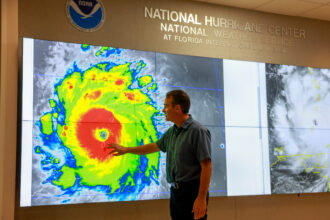On Monday, the website for the federal government’s 35-year old Global Change Research Program—an entity that is required to release periodic reports concerning the environmental change in the Earth’s climate—went dark.
The program is part of an interagency effort to, among other things, create an authoritative report known as the National Climate Assessment every four years on international and national climate science to better inform politicians and local decision-makers. The program also produces a yearly update for Congress.
The removal of the website is the latest in a string of attacks on the Global Change Research Program by the Trump administration. In April, the Trump administration cut staffing and funding at the program.
Later that month, the administration suddenly dismissed all of the scientists that were working on the sixth National Climate Assessment, which was set to be released in 2028. This included Rachel Cleetus, the senior policy director with the Climate and Energy Program at the Union of Concerned Scientists.
“It’s an honor to be invited to participate,” said Cleetus, who, like most other scientists working on the assessment, was a volunteer. “It was a real disappointment not just to see the effort disbanded, but there’s been no word from the administration about what they intend to do.”
Now, it’s not just the future of the program’s work that is at risk, but also its past reports and data, which can only be accessed on a handful of websites and the Internet Archive’s Wayback Machine. The previous National Climate Assessments can be accessed through the National Oceanic Atmospheric Administration website.
According to some former participants in the National Climate Assessment, the removal of these reports and the potential failure to write new ones could be grounds for legal action under the language of the Global Change Research Act of 1990, the bill that established the Global Change Research Program.
The statute requires that the program’s research findings, like the annual update report and the quadrennial National Climate Assessment, must be submitted to Congress and the president. The findings must also be available to all federal agencies and departments for use in the creation of related policy.
The White House did not respond to a request for comment.
For members of the public, the National Climate Assessment can also be an important source of information on region-specific climate issues.
The assessment is “really meant to provide the kind of actionable information that communities, decision-makers, businesses can use to help inform their decisions about how to protect themselves as climate change is worsening,” said Cleetus.
This is not the first time that the Trump administration has taken aim at climate science. At the beginning of his term in January, President Trump revoked former President Biden’s executive order to establish the country’s first National Nature Assessment, which would have studied U.S. natural resources and wildlife. The scientists involved with that effort said they will likely publish it independently.
The administration has also scrubbed references to climate change from multiple government websites and has cut funding to research related to climate science. For many scientists, the removal of this website is just another assault on the public’s understanding of climate issues.
“It is to the benefit of all Americans to be aware of this information and what it means to us,” said Donald Wuebbles, the Harry E. Preble emeritus professor of atmospheric science at the University of Illinois, who co-led the first volume of the fourth National Climate Assessment in 2017.
“Climate change is one of the most serious issues humanity has ever faced, and for us to not take that seriously, as this administration is doing, it’s criminal,” said Wuebbles.
Ultimately, the National Climate Assessments do not produce any new scientific information, but instead synthesize and analyze present data for a comprehensive look at what different regions are experiencing. The result is an authoritative report that lawmakers can trust when drafting legislation.
“The science itself will endure, but making sure that it’s publicly accessible in a useful format for decision makers—that was a unique responsibility and really the domain of the federal government,” said Cleetus. “This is not random, this is an orchestrated strategy to try to bury the evidence.”
About This Story
Perhaps you noticed: This story, like all the news we publish, is free to read. That’s because Inside Climate News is a 501c3 nonprofit organization. We do not charge a subscription fee, lock our news behind a paywall, or clutter our website with ads. We make our news on climate and the environment freely available to you and anyone who wants it.
That’s not all. We also share our news for free with scores of other media organizations around the country. Many of them can’t afford to do environmental journalism of their own. We’ve built bureaus from coast to coast to report local stories, collaborate with local newsrooms and co-publish articles so that this vital work is shared as widely as possible.
Two of us launched ICN in 2007. Six years later we earned a Pulitzer Prize for National Reporting, and now we run the oldest and largest dedicated climate newsroom in the nation. We tell the story in all its complexity. We hold polluters accountable. We expose environmental injustice. We debunk misinformation. We scrutinize solutions and inspire action.
Donations from readers like you fund every aspect of what we do. If you don’t already, will you support our ongoing work, our reporting on the biggest crisis facing our planet, and help us reach even more readers in more places?
Please take a moment to make a tax-deductible donation. Every one of them makes a difference.
Thank you,













